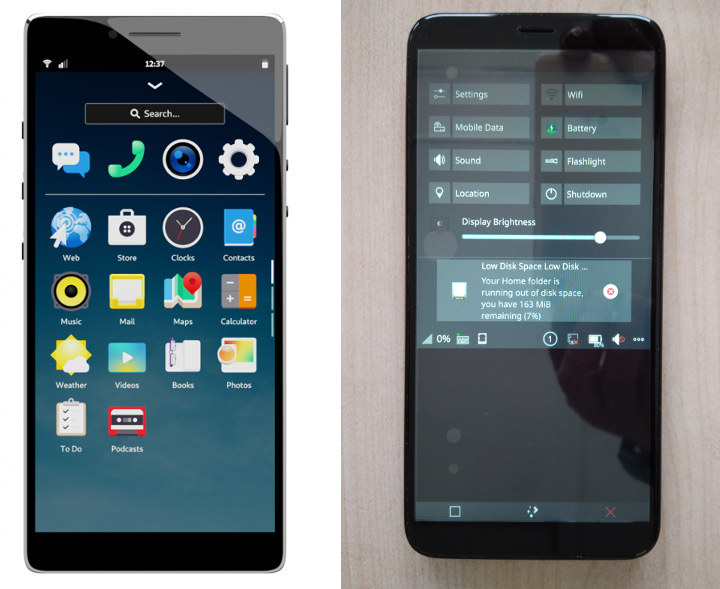There are too highly anticipated Linux smartphones currently in development namely Purism Librem 5 and Pine64 Pinephone. The first one, based on NXP i.MX 8M processor is fairly pricey ($699) partly because of better specifications, but mostly because the company handles software development internally, while Allwinner A64 Pinephone has somewhat lower specifications, but a much lower $150 price tag as software development is done by the community.
Neither phones are available, and until a few days ago there were no clear launch dates. This has now changed as Purism announced Librem 5 would start shipping on September 24, while Pinephone first batch is scheduled for mid-October, which should also be the date for the launch of pre-orders, and shipment will start in November.

This sounds great, but be warned the first phones will be for enthusiasts who do not mind having a few defects and missing hardware/software features, and the final products will really show up in 2020.
Librem 5 Production Schedule
Six shipment batches are planned so far with details as follows:
- Batch Aspen – September 24th – October 22nd
- Hardware – Initial board, all hardware components included.
- Mechanical Design – Individually milled case, loose fit, varying alignment, unfinished switch caps (hand crafted).
- Software – Initial release of core Apps, manage contacts, basic web browsing, early power management, software updates from the PureOS Store via the terminal.
- Certifications: FCC and CE for Radios
- Batch Birch – October 29th – November 26th
- Hardware – Next run of board, all hardware included.
- Mechanical Design – Aspen + tighter fit, improved alignment.
- Software – Aspen + improved setup, improved web browsing, improved power management.
- Certifications: FCC and CE for Radios
- Batch Chestnut – December 3rd – December 31st
- Hardware – All hardware included.
- Mechanical Design – Birch + capped switches.
- Software – Birch + final setup, improved web browsing, improved power management.
- Certifications: FCC and CE for Radios
- Batch Dogwood – January 7th – March 31st
- Hardware – All hardware included.
- Mechanical Design – Chestnut + refinements.
- Software – Chestnut + core apps improved, additional applications, refined graphical PureOS Store.
- Certifications: FCC and CE for Radios
- Batch Evergreen – Q2 2020
- Hardware: All hardware included
- Mechanical Design – Molded case.
- Software: Long term support release
- Certifications: FCC and CE
- Batch Fir – Q4 2020
- Hardware – 14nm Next-Generation CPU
- Mechanical Design – Version 2
- Software – Long term support release
- Certifications: FCC and CE
That means the final product will be sold in Q2 2020, and the second generation based on i.MX 8Mini? will be ready by the end of next year.
Pinephone Mass-production Schedule
Pinephone is actually up for pre-order but for developers only, as those are prototypes available in limited quantity, and more lower-level software development work is needed. They are not sending units to app developers, tinkerers or end-users at this point, but “Brave Heart” editions will become available in October 2019 and beyond.
As the name implies, those won’t be consumer-ready, as there will be no complete OS images available at that time. There will be two “Brave Heart” production batches, and this time they target enthusiasts who wish to contribute to development by debugging, testing builds and offering feedback. The phones will ship without an OS preinstalled, and people will likely run daily or weekly builds from a microSD card instead of flashing the OS to the eMMC flash.
The plan is to start the production line on mid-October and pre-orders around the same time. The first batch of PinePhones should ship in November and the second batch before Christmas. Depending on feedback from developers, there may also have one single larger “Brave Heart” batch instead. So the schedule is not frozen in stone.
If you’d like a Linux phone that (mostly) just work, you’ll have to wait at least until March 2020, as a commercial-scale production of PinePhones has been scheduled for that time.

Jean-Luc started CNX Software in 2010 as a part-time endeavor, before quitting his job as a software engineering manager, and starting to write daily news, and reviews full time later in 2011.
Support CNX Software! Donate via cryptocurrencies, become a Patron on Patreon, or purchase goods on Amazon or Aliexpress




